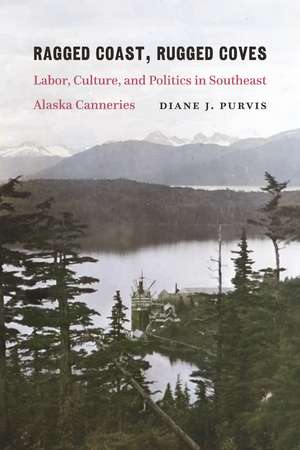Ragged Coast, Rugged Coves: Labor, Culture, and Politics in Southeast Alaska Canneries
Autor Diane J. Purvisen Limba Engleză Paperback – sep 2021
Canned salmon was territorial Alaska’s most important industry. The tax revenue, though meager, kept the local government running, and as corporate wealth grew, it did not take long for a mix of socioeconomic factors and politics to affect every aspect of the lands, waters, and population. During this time the workers formed a bond and shared their experiences, troubles, and joys. Alaska Natives and Chinese, Japanese, and Filipino immigrants brought elements from their ethnic heritage into the mix, creating a cannery culture.
Although the labor was difficult and frequently unsafe, the cannery workers and fishermen were not victims. When they saw injustice, they acted on the threat. In the process, the Tlingits and Haidas, clans of Southeast Alaska for more than ten thousand years, aligned their interests with Filipino activists and the union movement. Ragged Coast, Rugged Coves tells the powerful story of diverse peoples uniting to triumph over adversity.
Preț: 148.47 lei
Nou
Puncte Express: 223
Preț estimativ în valută:
28.41€ • 29.80$ • 23.65£
28.41€ • 29.80$ • 23.65£
Carte disponibilă
Livrare economică 11-25 martie
Preluare comenzi: 021 569.72.76
Specificații
ISBN-13: 9781496225887
ISBN-10: 1496225880
Pagini: 384
Ilustrații: 10 photographs, 1 map, index
Dimensiuni: 152 x 229 x 23 mm
Greutate: 0.45 kg
Editura: Nebraska
Colecția University of Nebraska Press
Locul publicării:United States
ISBN-10: 1496225880
Pagini: 384
Ilustrații: 10 photographs, 1 map, index
Dimensiuni: 152 x 229 x 23 mm
Greutate: 0.45 kg
Editura: Nebraska
Colecția University of Nebraska Press
Locul publicării:United States
Notă biografică
Diane J. Purvis taught cultural history at Alaska Pacific University for twenty-five years. She is the author of The Drive of Civilization: The Stikine Forest versus Americanism.
Cuprins
List of Illustrations
Introduction
1. A Time before the Salmon Cans
2. The Tin Can Men
3. Metlakatla and the Tsimshian
4. From Norwegian Fjords to Alaskan Glaciers
5. Salmon and the Politics of Corporate Capitalism
6. The Immigrants Are Necessary but Unwelcome
7. The Rising Voices of Alaska Natives
8. The Alaskeros
9. Fighting Back with Unions in the 1930s
10. A Union of Their Own
11. The Inequities of War
12. The Hanna Hearings and Hydaburg
13. The Cannery Period Heyday Wanes
14. When Cannery Children Remember
Notes
Bibliography
Index
Introduction
1. A Time before the Salmon Cans
2. The Tin Can Men
3. Metlakatla and the Tsimshian
4. From Norwegian Fjords to Alaskan Glaciers
5. Salmon and the Politics of Corporate Capitalism
6. The Immigrants Are Necessary but Unwelcome
7. The Rising Voices of Alaska Natives
8. The Alaskeros
9. Fighting Back with Unions in the 1930s
10. A Union of Their Own
11. The Inequities of War
12. The Hanna Hearings and Hydaburg
13. The Cannery Period Heyday Wanes
14. When Cannery Children Remember
Notes
Bibliography
Index
Recenzii
"Purvis and the staff at the University of Nebraska Press deserve a great deal of credit for publishing this book, as Ragged Coast, Rugged Coves is a useful reminder of the remarkable history in this important part of the North American West. This book is a substantial contribution to western labor and social history. It will make a strong addition to university library holdings and I encourage instructors teaching upper-division or graduate courses in western and labor history to consider assigning this fine scholarly work."—Journal of the Gilded Age and Progressive Era
"An essential addition to historical studies of Alaska, this well-researched work explores how Alaska Natives have been conspicuously disadvantaged in the fishing industry, notably the fish cannery business. . . . Purvis (formerly, Alaska Pacific Univ.) pays close and sympathetic attention to the rising voices of the Alaska Native Brotherhood and Alaska Native Sisterhood. Attention to women's activities is refreshing and important. This well-written book is an eye-opening look into a multiethnic world hitherto imagined but insufficiently described."—B. M. Gough, Choice
“Ragged Coast, Rugged Coves demonstrates that indigenous peoples in Alaska engaged capitalism and colonialism on several levels and were not simply overwhelmed by them. Alaskan workers built alliances that had an important impact on and legacy for Southeast Alaska—a history that deserves to be remembered.”—Chris Friday, author of Organizing Asian-American Labor: The Pacific Coast Canned-Salmon Industry, 1870–1942
“Ragged Coast, Rugged Coves paints a picture of an Alaska with a racially diversified population . . . and offers a refreshing view of women in the workplace and in labor organizing. This book is really a fascinating narrative, and it fills an important niche in the history of Alaska, the fishing and canning industries in the West, and the labor movement.”—Roberta Ulrich, author of Empty Nets: Indians, Dams, and the Columbia River
Descriere
Ragged Coast, Rugged Coves explores the untold story of cannery workers in Southeast Alaska from 1878 through the Cold War, particularly how making a living was pitted against the economic realities of the day.
